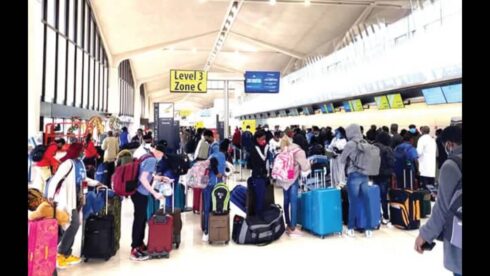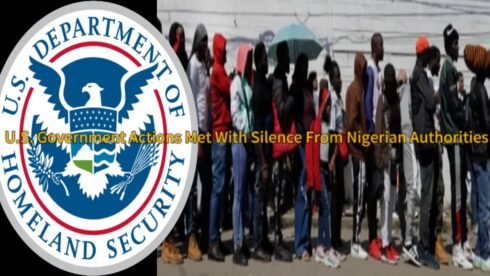The USA Government has issued a direct and uncompromising warning to international students, including Nigerians, whose visas have been revoked or cancelled. A spokesperson from the Department of Homeland Security (DHS) stated, “Do not attempt to remain in the United States. The federal government will find you,” signaling an unprecedented escalation in immigration enforcement.
The USA Government revealed that this directive applies to students with lapsed, invalid, or administratively cancelled visas, including those whose educational status has changed. Immigration officials have activated internal monitoring systems and databases to identify individuals who have remained in the country unlawfully following their visa’s termination.
USA Government Targets Nigerian Students in Escalating Crackdown
The USA Government has come under fire for disproportionately targeting Nigerian students in its latest immigration purge. Reports from advocacy groups suggest that a large number of cancelled visa notifications were served to Nigerian nationals, many of whom maintain full-time academic enrollment and legal status.
The U.S. Government has, however, denied any discriminatory motive, asserting that visa cancellations were based on compliance data from the SEVIS (Student and Exchange Visitor Information System). Still, Nigerian students are calling the process vague, emotionally draining, and lacking due process, especially when communication from authorities is often sudden and without detailed justification.
USA Government Deploys Surveillance Technology to Locate Students

The U.S. Government has begun deploying surveillance and artificial intelligence tools to trace the whereabouts of students affected by the visa crackdown. Through facial recognition from university cameras and cellphone geolocation data, authorities are actively tracking those attempting to remain in the country.
The U.S. Government has authorized Immigration and Customs Enforcement (ICE) to collaborate with educational institutions and transport services, including airlines, to collect travel and movement data. Civil rights advocates have condemned the methods as excessive and invasive, accusing the government of criminalizing international students without trial or transparency.
U.S. Government Leaves Universities in Confusion and Crisis
The U.S. Government has been accused of blindsiding universities by executing the visa revocations without adequate coordination. Several institutions have expressed frustration over being left uninformed, while their students are forced to scramble for legal help or face deportation proceedings.
The U.S. Government’s enforcement has triggered a wave of emergency meetings within universities, especially those with high international enrollment. Some universities have mobilized legal teams, while others have offered short-term housing and travel grants to support displaced students—efforts that some say are too little, too late amid a growing academic crisis.
U.S. Government Actions Met With Silence From Nigerian Authorities
The U.S. Government’s visa enforcement has raised diplomatic questions as Nigerian authorities remain silent on the plight of their citizens. No official statement has been released from Nigeria’s Ministry of Foreign Affairs or its embassy in Washington, despite mounting pressure from diaspora groups.
The U.S. Government’s clampdown has left Nigerian students in limbo, with no clear channels for support or negotiation. As students face expulsion and legal threats, the absence of a diplomatic safety net has amplified the emotional toll and stirred anger within the global Nigerian academic community.
U.S. Government Enforcement Carries Serious Immigration Consequences
The U.S. Government has warned that those who refuse to comply with the order to leave may face lifelong consequences. This includes automatic bans of up to 10 years, blacklisting from future visa programs, and even criminal records that can restrict travel to other nations.
The U.S. Government urges affected students to seek immediate legal counsel and make arrangements to exit the country legally to avoid detention. Immigration lawyers are warning that ignoring the order could permanently derail the academic and professional aspirations of hundreds of young Nigerians and other foreign nationals.














